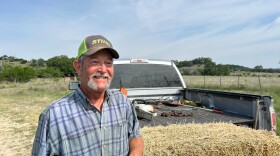-
Alpha-gal syndrome, a tickborne allergy to red meat and dairy, has become more common in the last few years. The condition poses unique challenges to the lives and livelihoods of U.S. ranchers and farmers.
-
Producers across the central U.S. are facing high input costs as the trade war puts crop markets in an uncertain position. Agriculture economists say they’re watching tariffs and the cattle industry — which has boosted income for some farmers.
-
President Donald Trump has revealed that he is planning to import more beef from Argentina to lower the market cost. Missouri's cattle farmers are grappling with what this means for the beef industry.
-
The beef processing plant in Olathe, Kansas, marked a turning point for Walmart. But ranchers and agricultural experts warn the nation’s already stunted beef industry could be falling under more corporate control.
-
Virtual fencing uses GPS collars, sounds and electrical cues to move cattle across a landscape. Along with saving ranchers time, researchers say this new technology can help protect, and create, wildlife habitat.
-
More than 50 wagyu beef farms in Missouri are listed with the American Wagyu Association. Because Japan stopped exporting genetically pure wagyu cattle in 1997, most American farmers crossbreed the cattle with Angus beef cows.
-
Shoppers are seeing record high beef prices at the grocery store. That’s in part because the number of cattle in the U.S. is at an all-time low, while consumer demand has remained strong.
-
The cattle feedlots on the western side of Kansas produce a significant amount of the beef in your grocery store. But a small town in the region is now opposing a feedlot because of health and environmental concerns.
-
New World screwworms used to be a constant concern for ranchers, until they were eradicated from the U.S. in the 1960s. Now that they’re on their way back, those who remember dealing with them have warnings about their impact.
-
It’s been decades since the New World Screwworm was a problem in the U.S., but the flies are now advancing northward from Panama. They could disrupt American agriculture if they gain a foothold here again.
-
Another year of dry conditions could hurt production for farmers growing crops and raising livestock in the region.
-
The new strategy aims to pinpoint where bird flu exists in the U.S. and halt its spread. There have been hundreds of cases in cattle and dozens in humans.
Play Live Radio
Next Up:
0:00
0:00
Available On Air Stations












